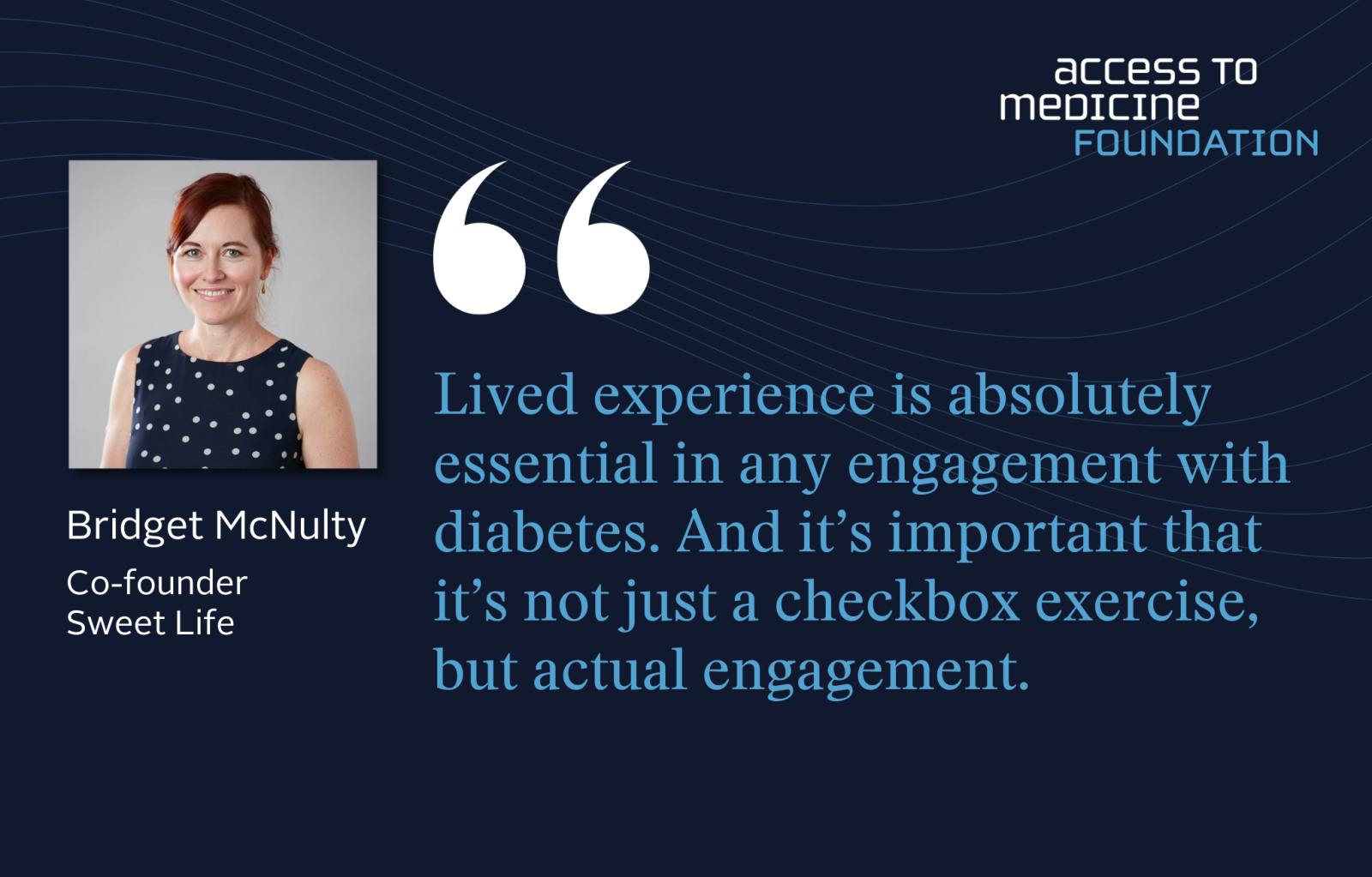Diabetes advocate Bridget McNulty shares why "collaboration is essential" to improving access to care in South Africa
From your perspective as a patient advocate, what are the significant unmet needs in terms of access to diabetes care in South Africa, and how does this impact your local community?
South Africa is doing well in terms of access to insulin - thank heavens. Any person with diabetes needing insulin can get it for free from their local clinic. It might not be the latest insulins, but some clinics and hospitals advocate for those and are able to get limited access. When it comes to glucometers and strips, these are technically available to everyone on insulin, but the policy doesn’t always translate to access - it can be quite geographically dependent.
South Africa has a public and private medical split, where 85% of the population accesses public care, and 15% pay for private medical aid. I’m speaking here of public access, because that’s the majority of the Sweet Life Diabetes Community, and really where we need to be focusing our energy.
The Access to Medicine Foundation’s focus on cohesive coverage is particularly relevant to the South African context, I think, in particular the goal of ensuring that access strategies address context-specific gaps and contribute to long-term sustainability and integration into health systems.
There are a few significant unmet needs in the South African diabetes space. I would say two of the loudest are access to cohesive diabetes education - there’s currently no national diabetes education programme - and access to sensor technology. We know that diabetes self-management education leads to better blood glucose control, but there’s a gap in what is being provided to people with diabetes. We’re trying to fill that gap.
Even in the private sector, there’s very limited access to continuous glucose monitors (CGMs) or flash glucose monitors, despite all the data showing what an enormous impact they have not only in terms of diabetes management but also quality of life for people with diabetes. We’re doing all we can to try to broaden access, and it’s something our community asks for repeatedly, but it’s very slow moving. Even if we can just get flash glucose monitors (the cheapest on the market) for kids under seven (a very small population), that would make such a huge difference.
Sweet Life has been active in empowering and involving people with diabetes. Could you share examples of how this empowerment has improved access to essential products along the diabetes continuum of care?
As a person living with diabetes, you’re managing your condition on your own 8,758 hours a year, with 2 hours (if you’re lucky) with a healthcare worker. We have to empower people with diabetes to be able to manage their condition as well as possible. A big part of that, for us, is giving them the tools to understand what the care is that they are legally obligated to receive. As I mentioned, access to care differs depending where you are in the country - we hear this a lot from our community. Some people with Type 2 who are on insulin receive a glucometer and strips as soon as they start insulin, others never do. We recently developed a diabetes rights campaign, in collaboration with the National Department of Health, Prof Joel Dave at the Groote Schuur Diabetes Centre, and Dr Neal David and Dr Amanda Saunders, both working in primary care clinics. From the private perspective, we checked the benefits available across three different medical aids, and confirmed the details with the medical aids.
The result is a simple-to-understand leaflet and social media graphics that outline the basic care bundle - for public and private, Type 1 and Type 2. You can take a look at it here. It’s currently with the National Department of Health for official endorsement, because in order for it to be truly useful, our community members have to be able to show it to their healthcare worker and access the care they are entitled to. We have also incorporated this information into our WhatsApp diabetes education chatbot, Africa Diabetes Chat, which you can test out by messaging ‘Hi’ to +27 87 721 5714.

The Foundation recently hosted a workshop on diabetes care in Amsterdam and one of the key takeaways from the session was that companies should look at care more holistically by engaging with people living with diabetes, understanding their perspective and integrating that in their strategies and initiatives. Being a strong diabetes voice in South Africa, what do you think companies can do to improve access to diabetes products for people living in LMICs?
Lived experience is absolutely essential in any engagement with diabetes. And it’s important that it’s not just a checkbox exercise, but actual engagement. It is encouraging that this emerged as a key takeaway from the workshop, and shows the value of bringing together different stakeholders to share insights and identify ways forward.
I’m the current chairperson of SA Diabetes Advocacy, which is a non-profit encompassing all the organisations of people with diabetes in South Africa. One of the services we offer to our community is a free four-week online diabetes advocacy training programme, and as a result of that we have a network of diabetes advocates across the country who are ready and willing to speak to lived experience in every context.
I think it can be difficult to deeply understand life with diabetes from the outside, and companies may be making assumptions about what the needs actually are, and what diabetes products will truly make an impact. In addition, the South African context is very different from our European or American counterparts. Involving people with diabetes at every step ensures that we’re all working towards a common goal.
What do you think is the role of partnerships and collaborations in closing gaps in access to diabetes products in LMICs?
Collaboration is essential - we’re not going to get anywhere without it. One of the reasons I co-founded the Diabetes Alliance, which is all the associations, organisations and companies working in diabetes in South Africa, was to break down the silo approach to diabetes care. To ensure we could speak to the National Department of Health with one cohesive voice. At the end of the day, we all want the same thing: better health for people with diabetes in South Africa. So why not work together?
We’ve taken this same approach with SA Diabetes Advocacy, where we’ve joined voices as all the individual patient organisations and openly discuss how to create better access with pharmaceuticals and manufacturers, and with Sweet Life, where we bring the community voice to local and international organisations.
One of the key components of Africa Diabetes Chat, our WhatsApp education chatbot, is that we’re building a framework that makes it easier to scale across other African countries - right from the start. Some components will obviously be regionally specific, but why build a specifically South African solution where much of the content can be translated for other African countries?
The Access to Medicine Foundation focus on partnerships is very powerful, I think. Particularly the goal to pursue partnership approaches to address challenges that patients face in accessing both insulin and other essential products for diabetes care.
So many of the diabetes solutions we need are consistent from country to country - every meeting of the WHO Global Compact Forum highlights that for me. The time for working in silos is past. We have been gifted the online tools to collaborate with each other all over the world, and we need to take advantage of that.
How can Access to Medicine Foundation and Sweet Life collaborate to enable stronger access ecosystems?
What I love about a collaboration between the Access to Medicine Foundation and Sweet Life is that we speak to both essential parts of the drive for change: head and heart. The Access to Medicine Foundation offers the thinking behind why expanding access to treatments, monitoring devices, and other essential products for people living with diabetes in LMICs is important. Sweet Life offers the lived experience and emotion behind it. On a practical level, I think it’s essential for the Access to Medicine Foundation to integrate lived experience into every aspect of its work, and for Sweet Life to use some of the findings and discussion space provided by the Foundation diabetes care programme to enhance our advocacy and education work.
In particular, the Access to Medicine Foundation’s engagement with both lived experience and research is very powerful. The Foundation commits to using “a blend of research and stakeholder dialogue to identify solutions for companies to expand access to insulin and diagnostics,” and I think this is an approach that can ensure the right voices and perspectives are captured.
This kind of attitude is what will have the most impact for people with diabetes - in South Africa, and worldwide.
